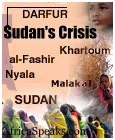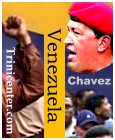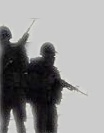 |






 AfricaSpeaks Weblog AfricaSpeaks Weblog
 Rootswomen Weblog Rootswomen Weblog
 Rootsie's Weblog Rootsie's Weblog
|
American Fiction
Posted: Monday, May 5, 2003
By Stephen Gowans, http://www3.sympatico.ca/sr.gowans
The way most Americans see it, their peace and security is menaced by rogue states with appetites for weapons of mass destruction and ties to terrorists.
US President George W. Bush sums it up perfectly: "Any outlaw regime that has ties to terrorist groups or has weapons of mass destruction is a grave threat to the civilized world." [1] And Bush goes further, putting menaces to civilization on notice, warning that they will be "confronted."
The problem with the Bush view is that while there may be outlaw states with keen appetites for terrible weapons who have ties to terrorists, the most dangerous of all countries to fit the bill is the United States itself, which is (a) an outlaw, (b) possessor of history's largest arsenal of weapons of mass destruction (with a proven track record of using them) and (c) has a long history of backing terrorists groups and sheltering terrorists from prosecution abroad. Moreover, the country engages in "state" terrorism; it has, on more than one occasion, deliberately set out to terrorize civilian populations to achieve its political and strategic goals.
Washington's outlaw nature has just been proved in spades by its illegal invasion of Iraq, carried out in defiance of international law and without the backing of the UN Security Council. But that's just the last in a long string of outlawed actions. The invasion of Afghanistan; the bombing of Yugoslavia; cruise missiles slamming into a Sudan aspirin factory; people -- including children -- abducted from Afghanistan and caged in 6.8 X 8 foot cells at a Gautanamo Bay concentration camp; the use of "controversial" weapons, including cluster bombs and depleted uranium -- these are simply the most recent entries in a docket teeming with crimes.
And there's no mystery about Washington having an immense appetite for weapons of mass destruction, or, in light of Washington's latest Nuclear Posture Review, of the Pentagon being prepared to use them. The only mystery is how Americans can perceive any slight in their country being called a hypocritical bully for demanding some countries do without the same weapons the US stockpiles, uses, and sells around the world.
As for the country's ties to terrorists, I need only mention the Contras, the Mujahdeen, the Kosovo Liberation Army, and the Florida-based anti-Castro groups, all either openly or covertly backed by Washington. And Washington's yen for state terrorism is amply evident in Human Rights Watch head Kenneth Roth's euphemistically expressed concerns over the Pentagon's "targeting of civilian morale" in Iraq [2] and in US Air Force Lt. General Michael Short's infamous glimpse into the strategy behind NATO's campaign of bombing Yugoslavia. Explained Short: "If you wake up in the morning and you have no power to your house and no gas to your stove and the bridge you take to work is down and will be lying in the Danube for the next 20 years, I think you begin to ask, 'Hey, Slobo, what's this all about? How much more of this do we have to withstand?'" [3]
There is, however, some truth in US foreign policy being focussed on confronting "rogue" or "outlaw" regimes, if you ignore the dictionary definition of the words and concede that Washington is using the words in unconventional ways. Rogue states, to the public opinion manipulators in Washington, are, first, states that are not now, and refuse to become, vassals of the United States. They need -- to use a language often used by the American media -- to be "brought to heel", or to be "brought in line," though the language almost invariably omits a concluding statement that specifies what "outlaw" countries need to be brought in line with. The answer is US interests, and, specifically those of its corporations and banks. Target countries may be pursuing a foreign policy that is independent of Washington's (and therefore, not conducive to the profit interests of American firms), and they may, at the same time, refuse to allow their economies to be annexed to that of the United States, or to subordinate domestic economic interests to those of US capital.
But rogue states, in Washington's use of the word "rogue," are more than renitent; they must also be weak and easily bullied to qualify as "outlaw" regimes. Indeed, Washington's victims are invariably miserably poor countries that are almost always no match militarily for the United States, which, after all, maintains armed forces vastly larger than those of all its victims and intended victims combined. No better illustration of this is provided than in the yawning gap between US military spending and that of Washington's latest victim, Iraq. Iraq accounted for a fraction of one percent of all military spending in the world, versus the United States 50 percent. [4] Astonishingly, Americans take great pride in their bloated military prevailing in these grossly unequal contests, thinking theirs is the greatest martial country in history for rolling over such military giants as Grenada (population: a little over 100,000), Panama, Afghanistan and Iraq. The truth of the matter is that like any bully, the United States only picks on 98-pound weaklings, those it knows it can crush without a whole lot of effort, and, importantly, without significant loss of American lives. Significant loss of lives in the target country is not, however, an issue.
The rhetoric about safeguarding civilization from the scourge of outlaw regimes that court terrorists is just that: rhetoric. US foreign policy is more accurately described by Michael Ledeen, holder of the freedom chair of the right-wing think-tank the American Enterprise Institute, much beloved in Washington. As Ledeen puts it: "Every 10 years or so, the United States needs to pick up some crappy little country and throw it against the wall, just to show the world we mean business." [5] Of course, the targeting of crappy little countries is happening a little more frequently than once every ten years, but you get the point. American policy isn't about making civilization safe (unless "civilization" is equated with the interests of US shareholders); it's about bullying weak countries, which means forcing them to trash all their silly notions about sovereignty. And "crappy little countries" are nothing more than weak, easily picked on states, that hold to quaint ideas like, "Maybe we should be running our own affairs."
If the true outlines of US foreign policy are not already evident, consider its recent history.
When North Korea offered to abandon its nuclear weapons program and to stop selling ballistic missiles in return for food aid, oil shipments, and a nonaggression pact, Washington dismissed the offer as wholly unacceptable. Washington doesn't negotiate. It issues demands, and expects compliance. Or else.
When Iraq bent to every demand made by the UN to readmit weapons inspectors and to allow overflights of its territory, Washington dismissed Baghdad's compliance as wholly unacceptable. The regime would have to be replaced by one that did what it was told and opened its doors to domination by US oil firms. Or else.
When the Taliban offered to hand over Osama bin Laden, if Washington disclosed evidence of bin Laden's involvement in the Sept. 11 attacks, Washington dismissed the offer as wholly unacceptable. Washington doesn't negotiate. It issues demands, and expects compliance. Or else.
When Yugoslav President Slobodan Milosevic made a proposal to avert war over Kosovo, Washington dismissed the offer as wholly unacceptable. Washington doesn't negotiate. It issues demands, and expects compliance. Or else. After 78 days of bombing, NATO settled on an agreement almost identical to Milosevic's original proposal. But Washington bombs first, to show it means business.
Bombing (or threatening to bomb) into submission isn't the only way Washington tramples the sovereignty of other countries; it also intervenes in the affairs of target countries, with the aim of bringing to power opposition groups beholden to Washington who will oversee a transition of the country's economy to one more congenial to US corporations. The destabilization is often carried out under the banner of promoting democracy, with target regimes in multiparty states that win elections accused of rigging the vote, and compliant regimes that rig elections, or opt for dictatorship, being held to a different standard.
Before the first ballot was even cast in the last election Slobodan Milosevic would face before being ousted in a Western-backed coup, Washington warned than a victory by Milosevic's Socialist Party over the coalition backed by the US, could mean only one thing: that Milosevic had rigged the vote.
When Robert Mugabe's ZANU-PF party won Zimbabwe's last election, defeating the Western-backed coalition of Morgan Tsvangirai, Washington complained the vote wasn't free or fair.
But when Olusegun Obsanjo, who has close ties to Washington, rode to victory under a cloud in Nigeria's last election, the New York Times reversed its initial description of the election as "botched," declaring that free and fair as a standard of judging elections was out, while credible -- the name given to Obsanjo's election -- was in.
Nigeria is one of the US's chief sources of oil, along with Saudi Arabia, Venezuela, and Canada. It's also considered Washington's top strategic partner in sub-Saharan Africa, along with South Africa.
Obsanjo presides over a country whose people live in abject poverty, despite great oil wealth. According to the World Bank, almost 40 percent have no access to clean water, while one-third is illiterate.
With the elections over, it's expected Obsanjo will throw the country's doors wide open to Western investors, allowing the privatization of state owned companies, including the state-owned oil company. Controlling the oil of some countries means fabricating a casus belli as cover for an invasion. In other countries it means getting the right guy elected, in credible, if not free and fair, elections.
Anyone who sees merits in programs that put the material interests of domestic populations ahead of the profit interests of banks and corporations (whether through the public provision of such services as health care and education, public housing or full employment policies) should have no illusions about the intended aims of destabilization programs carried out under the banner of promoting human rights and democracy; nor should they be under any illusion about whose interests are being pursued by the leaders of Washington's "strategic" partners; and nor should they be gulled into believing that US-backed opposition coalitions that adopt such names as the "Democratic" Opposition (Serbia) or the Movement for "Democratic" Change (Zimbabwe), or that "dissidents" in Cuba working for democracy, are so concerned with democracy, as they are with making over the domestic economy to serve the interests of US capital. In this, the DOS, the MDC, and the Cuban dissidents, are no different than Obsanjo, except in one respect: Obsanjo is already a satrap, while the others have yet to attain the exalted position of chief bendover to US corporate interests, with all its attendant rewards and privileges.
As to the question of whether Washington truly supports democracy abroad, one need only ask, Will the US occupation government in Iraq allow any room for the Communist Party to pursue electoral success on anything resembling a fair playing field in the election that is to give Iraqis their first taste of democracy, American-style? The answer, if not already obvious, is furnished by two former National Security Advisers. Henry Kissinger, Nixon's adviser, once asked, in connection with the Chilean electorate voting for the reformist Salvador Allende, "I don't see why we need to stand by and watch a country go communist because of the irresponsibility of its own people." Never one to stand by, Kissinger ensured Augusto Pinochet would sweep Allende aside in a bloody coup, so that the people of Chile could be taught something about responsibility, a lesson since learned in Nicaragua and Serbia, where it has been made clear that a vote for the wrong candidate means sanctions, war and destabilization. And Brent Scowcroft, adviser to Bush I, shows that whatever else may have changed, Washington's thinking on whether people will be allowed to vote for radicals, has remained refreshingly invariant. "What's going to happen the first time we hold an election in Iraq and it turns out the radicals win? What do you do? We're surely not going to let them take over." [6]
The elevation to governance of groups that conspicuously embrace democracy, human rights and open societies (and the promotion of US corporate interests more discreetly) often spells disaster for the domestic populations newly liberated from the tyranny of "rogue" governments, whose usual crime is to have leaned too heavily in the direction of the interests of the domestic population and not far enough toward the interests of the occupants of Wall St. boardrooms. Whatever improvements in material circumstances accrue from throwing open the doors to US capital, if any, are incidental, byproducts of whatever relief follows from Washington relaxing its stranglehold, and whatever wealth trickles down after the profit requirements of US firms are satisfied first. This should be clear from the capitalist restoration in Eastern Europe, hailed as a great stride in human rights and democracy, but which has been an economic disaster for the people of the region who have returned to their accustomed place on the margins of the capitalist world, contending anew with unemployment, homelessness, diseases once eradicated, a sinking life expectancy, and growing inequality.
But for Western firms, the stride forward has indeed been a great one, calling to mind a line from Phil Ochs' "Cops of the World": "The name for our profits is democracy." It is also frequently the name for the misery of legions of people. Which isn't to say that democracy isn't to be fervently wished for, only that true democracy, in a world dominated by huge firms and a colossus hell-bent on pursuing the interests of US firms by hook or by crook, hasn't much of a chance to flourish. At the moment, the choices on offer seem to be social achievements with something that falls short of true democracy (Cuba, for example), and few or no social achievements with something that falls short of true democracy (Saudi Arabia or Pakistan or, dare it be said, the United States?) But then there's always the utopia of America's self-described "democratic" left, a world of the imagination blessedly free of intervention by a hostile US regime intent on crushing anyone or anything that threatens the domination of US firms. But utopias belong to science fiction, as too does the world as most Americans see it, filled with rogue states with appetites for weapons of mass destruction and ties to terrorists.
1. "Bush declares fighting in Iraq all but over," The Globe and Mail, May 2, 2003.
2. "Give Iraqis real justice -- not a US puppet show," The Globe and Mail, April 10, 2003.
3. "What this war is really about," The Globe and Mail, May 26, 1999.
4. The shape of World War IV, by number, "The Toronto Star," April 5, 2003.
5. Quoted in Left Business Observer, #104, April, 2003.
6. "Spoils of war," The New York Times, April 10, 2003
 Printer friendly version Printer friendly version
 Send page by E-Mail Send page by E-Mail
|








